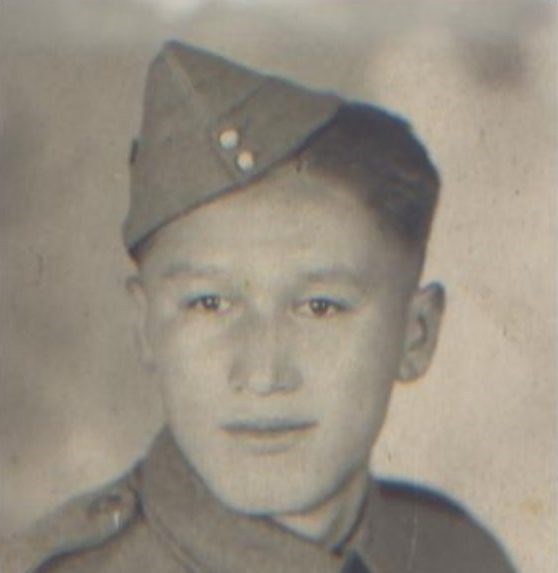It was September 1944. Dominic “Dick” Patrick and his brothers in arms were pinned down for two days by enemy fire near the village of Moerbrugge, in Belgium. It was damp and foggy, Patrick’s 17-pounder M-10 gun crew socked in so heavy they couldn’t tell where the Germans were firing from.
They were under heavy artillery fire and running low on supplies when Patrick asked permission to go ahead on foot to scout enemy positions.
“Despite the enemy fire he succeeded in getting into the middle of an enemy machine gun position… and there opened fire with his light machine gun,” says the commendation for Patrick’s Military Medal.
“His daring attack completely surprised the enemy… into surrender and cleared out a strong point which had pinned the infantry down for approximately 2 days.”
Fifty-five enemy soldiers surrendered in the face of Gunner Patrick’s stealth assault. It was a daring move that allowed the crew to continue their advance.
The following year Patrick was at Buckingham Palace, where King George VI awarded him the Military Medal for bravery in battle.
It was back home after the war that Dick Patrick faced his greatest battle.
Patrick was a member of the Saik’uz First Nation near Vanderhoof, one of several communities of the larger Dakelh, or Carrier, nation.
Born in 1920, he was sent to the Lejac Indian Residential School, a notorious institution operated by the Catholic Church near Fraser Lake from 1917 to 1976. It was from this school that nine-year-old Allen Patrick, eight-year-old Andrew H. Paul, eight-year-old Justa Maurice, and seven-year-old John Michael Jack were running, when they froze to death in January 1937.
The school was so bad that it earned a rare reprimand for the day, from the coroner who investigated the boys’ deaths for “excessive corporal punishment” and the failure to mount an effective search for the missing students, according to the National Commission for Truth and Reconciliation.
Patrick enlisted in 1942, one of 15 young men from Saik’uz who had to give up their “Indian” status to do so. He served with the 5th Canadian Anti-Tank Regiment in the 4th Canadian Armoured Division.
He and other Indigenous soldiers left behind a country where they could not vote and faced daily racism; where there were often separate entrances to grocery stores and bars and restaurants refused to serve them.
On the battlefields of Europe, though, they experienced a camaraderie and equality they had never known.
“When they were over in Europe they were treated like any other soldier. You were there to help them and that’s the way they looked at it,” says Raymond Yakeleya, an award-winning Dené documentary filmmaker. “But when he came back to Canada, that part of the world hadn't changed.”
After he was discharged in March 1946, Patrick returned to the northern B.C. community where Dakelh people were often segregated or turned away altogether. He walked into a café known to refuse First Nations, the Silver Grill, and sat down to order a meal.
When he was rebuffed, Patrick refused to leave.
The owners called RCMP, who arrested the young veteran. A local judge sent him to Oakalla prison for disturbing the peace.
Patrick contacted Maisie Hurley, an activist and founder of The Native Voice newspaper, who took up his cause. He was released – for the time being.
“In one year I spent 11 months in prison,” he told The Indian Voice newspaper in 1980. “I would just get off the bus and walk into a restaurant and they would send me back.
“I was bound and determined to show them they could not treat my people like animals.”
“He didn’t do anything wrong. He just wanted to get something to eat,” says Yakeleya. “They threw him in jail six months at a time but he wouldn't quit because in his heart, he knew he was right.”
According to the article for the Canadian Museum for Human Rights, Patrick did not get his meal at the Silver Grill Café. It’s likely he didn’t get the land or benefits promised to soldiers. Few Indigenous veterans did.
But Dick Patrick sparked a fight for equal rights that inspired many.
His story, which is memorialized online by the Canadian Museum for Human Rights, is being developed into a script by Yakeleya and renowned Sto:lo author Lee Maracle.
“It’s the kind of story that just stirs your heart. We can't forget this guy's name and we can't forget what he did,” says Yakeleya.
Dick Francis died in 1980.
Nov. 8 is Indigenous Veterans Day. Nov. 11 is Remembrance Day.
Dene Moore is an award-winning journalist and writer. A news editor and reporter for The Canadian Press news agency for 16 years, Moore is now a freelance journalist living in the South Cariboo.
SWIM ON
- Dene Moore last figured that since Facebook is in the news, let’s talk about why it prohibits selling farm-to-table local BC meat.
- The tragic story of Daniel Marshall’s great uncle in the Battle for Hill 70 - "one of General Currie's boys!"
- Kenneth Cothliff on the story of Reg Lane, one of the many who dared - and answered their country's call to war.



